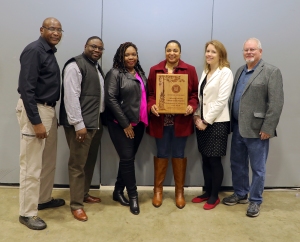Will Hehemann | School of Agriculture, Fisheries and Human Sciences

The Sustainable Forestry and African American Land Retention (SFLR) Program was awarded at the U.S. Forest Service’s (USFS) 2019 Regional Forester’s Honor Awards ceremony, which was held Thursday, Dec. 12, in Atlanta, Georgia. This SFLR parent program includes the University of Arkansas at Pine Bluff’s “Keeping it in the Family” (KIITF) forestry project.
The “Delivering State and Private Forestry Programs” award recognizes groups that have demonstrated major achievements in delivering state and private forestry programs to sustain the nation’s forest and grasslands and benefit the public. Alicia Cramer, senior vice president for the U.S. Endowment for Forestry and Communities (Endowment), accepted the award.
“This award acknowledges our participating landowners’ and their families’ efforts to curb African-American land loss across the southeast, as it demonstrates that intentionally-placed money can make a difference in our rural communities and our forestlands,” she said.
The SFLR program is a partnership of the USFS, the Endowment and U.S. Department of Agriculture Natural Resources Conservation Service (NRCS). It was launched in 2013 as an effort to aid African American landowners in turning their forested properties into economic assets.
“African American-owned farmland across the U.S. has drastically declined over the last century for reasons including voluntary sales, emigration from the South, lack of access to credit and capital and foreclosures,” Dr. Henry English, head of the UAPB Small Farm Program, said. “Current landowners face challenges when their land becomes heir property and is inherited by a group of individuals. This type of property leaves families without the clear titles that allow for active management of the land, thereby limiting any economic returns.”
Dr. English said UAPB’s KIITF program was started in 2016 to stem the loss of African American-owned land in Arkansas. Program staff and partners aim to educate forest landowners in the state about how to properly manage their land and apply conservation practices to improve its sustainability and value. The project has grown to encompass a total of 18 counties across the state.
“Landowners often underestimate the value of their acreage and decide to sell it before considering the benefits of keeping and maintaining it,” Dr. English said. “We want them to realize the value of properly managed forestland, as it can be used as an investment to produce income for future generations.”
In fiscal year 2018, the KIITF program provided forest management and heir property education to over 900 Arkansas landowners. KIITF personnel conducted 11 public meetings and 78 individual site visits. They developed forest management plans for 16 individuals and connected them with Arkansas Forestry Commission and NRCS representatives, as well as private foresters, contractors and loggers.
Twelve landowners received help with estate planning and writing wills and trusts. The program helped allot around $90,000 worth of NRCS Environmental Quality Incentive Program funds to implement conservation practices.
According to a press release, the Endowment recently hosted the premiere of the third episode of “America’s Forests with Chuck Leavell” at the Smithsonian National Museum of African American History and Culture in Washington D.C. The episode of the educational television show produced by the Public Broadcasting Service featured the efforts of the SFLR program. Over 350 people – including representatives from Congress, USFS and NRCS – attended the event.
The University of Arkansas at Pine Bluff offers all its Extension and Research programs and services without regard to race, color, sex, gender identity, sexual orientation, national origin, religion, age, disability, marital or veteran status, genetic information, or any other legally protected status, and is an Affirmative Action/Equal Opportunity Employer.

